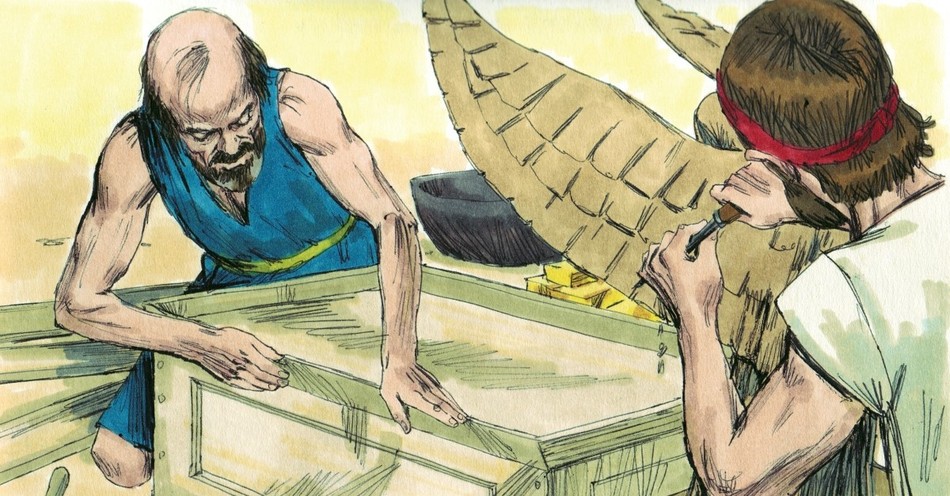Could you answer if a Christian friend asked, “Who was Bezalel in the Bible?” Most Christians would not know. Yet Bezalel holds a unique God-given calling—an artist. Sometimes, we don’t have the same high regard for creativity and artistry as God. Artistry may not seem “spiritual.” That’s why we must discover God’s message in gifting Bezalel with artistic skills. Then, we will be empowered to fulfill God’s workmanship (Ephesians 2:10) in whatever way God intends for each of us.
Where Does the Bible Mention Bezalel?
The Bible first mentions Bezalel in Exodus 31:1-3. God identifies him by name and commissions Bezalel to an important role. At least important to God but not always important to His children. Here is the description of God’s assignment.
The Lord said to Moses, “See, I have called by name Bezalel the son of Uri, son of Hur, of the tribe of Judah, and I have filled him with the Spirit of God, with ability and intelligence, with knowledge and all craftsmanship, to devise artistic designs, to work in gold, silver, and bronze, in cutting stones for setting, and in carving wood, to work in every craft. And behold, I have appointed with him Oholiab, (Exodus 31:1-6a ESV)
J.B. Cachila explains Bezalel’s name means “in the shadow (protection) of God.” Maybe Bezalel’s fellow Israelites didn’t always appreciate his gift—something he kept in the shadows that God brought to the tile. Maybe the name means he was criticized and needed God’s protection. We don’t know, but he wouldn’t be the first (or last) artist to be misunderstood.
How Many Crafts Did Bezalel Use?
Bezalel was highly skilled at many crafts because God had filled him with the Spirit of God specifically for God’s purposes in design and construction. God enabled him with abilities, intelligence, knowledge, and “all craftsmanship” (Exodus 31:3) to devise artistic designs in gold, silver, and bronze. Bezalel could also cut and set stones and carve wood.
That is an extensive and encompassing list. Yet God didn’t leave him without support. God also appointed Oholiab, the son of Ahisamach of the tribe of Dan, to work with him. These men, plus others (verse 6), would help Moses successfully obey God.
God seems to assure these craftsmen that He isn’t calling them without giving them the needed skills. He tells Moses, “They may make all that I have commanded you” (verse 6). The Lord is assuring the craftsmen and Moses.
The fact that God provided everything for Bezalel and his team to be successful can give us confidence that God doesn’t throw us out on our own to find our way. This passage also confirms that artistry and creativity are important to God. Art can be used to make biblical truths real and meaningful.
Today, art within the church can sometimes be misunderstood. If you find this subject confusing, consider Christianity.com’s article “50 Books on Christian Art” by G. Connor Salter. He writes, “Christians don’t have to figure out the complicated question ‘what does God think about art?’ on their own. Many intelligent Christian thinkers have considered how God views creative giftings and what it means to design Christian art.
Why Did God Call Bezalel to Make the Ark and Other Items?
The assignments of Bezalel and Oholiab occur after God tells Moses to construct the sanctuary (Exodus 25:8) and the ark of the covenant (Exodus 25:10). God is preparing everything His people will need to worship Him. The Lord says to Moses, “You are to speak to the people of Israel and say, ‘Above all you shall keep my Sabbaths, for this is a sign between me and you throughout your generations, that you may know that I, the Lord, sanctify you. You shall keep the Sabbath, because it is holy for you” (Exodus 31:13-14 ESV).
Worshipping God brings glory to God, draws the people’s hearts more in tune with their Lord, and builds confidence in their relationship with God. Worship also bonds believers with a location to meet and encourage each other. This is not an occasional duty or activity. No, God says, “Above all.” This is an activity of first priority. God supplies a building and symbols as a “sign” that God wants to sanctify them. He says He will help His children obey, grow in godliness, and know Him more accurately.
Such spiritual growth is essential for God’s glory to be shown to the world and to create an awareness of being saved. The sanctuary and the ark of the covenant are the primary symbols pointing to the coming Messiah Jesus, who will fulfill God’s plan. Believers will become the temple of the Holy Spirit (1 Corinthians 6:19). The ark housed the two tablets of the Law given to Moses by God. Jesus fulfills the requirements of the Law so that we no longer strive to perform perfectly to earn God’s love and salvation.
What did God Assign Bezalel to Make?
The variety of items God assigned Bezalel (included in Exodus 31:7-11) to make was extensive, including:
- the tent of meeting
- the ark of the testimony
- the mercy seat
- all the furnishings of the tent
- the table and its utensils
- the pure lampstand with all its utensils
- the altar of incense
- the altar of burnt offering with all its utensils
- the basin and its stand
- the finely worked garments
- the holy garments for Aaron the priest and the garments of his sons
- the anointing oil and the fragrant incense for the Holy Place
Bezalel’s assistant, Oholiab, added his talents as “an engraver and designer and embroiderer in blue and purple and scarlet yarns and fine twined linen” (Exodus 38:23). It seems nothing is forgotten.
We don’t know to what degree God’s words indicated exact designs. Perhaps that implies God gave them room to include some of their own creativity—the artist’s ideas can work with God to create something, merging God’s will and humans’ free will. However exact God’s instructions were, the fact he had called these men gave them the confidence to fulfill them. He was with them throughout the process.
What Can We Learn from Bezalel in the Bible?
What can we learn from Bezalel and his assigned team about creativity?
1. God never calls us to create something for His glory without giving us the skills and insights. That doesn’t mean we won’t need to learn and grow in our abilities. But that growth benefits us because we must depend upon His Holy Spirit. Even if our skills are great, we should pray and abide continually in dependence upon the Holy Spirit’s leading.
2. We learn that every calling of God has a significant purpose for displaying His glory and sovereign will. We might not always see His plan fulfilled immediately. We can be certain God always completes His intentions. Think of how God could have snapped His fingers, and everything He wanted could immediately be done without men’s involvement. After all, He “spoke creation into existence” (Genesis 1). Why does God sometimes instantly create things and other times take His time by using humanity? We don’t know. But both are His way of glorifying Himself.
3. We don’t have to understand God’s reasons for how He creates. Only obey. We take for granted without any question God created the heavens and the earth. It seems inconceivable that God would begin “His story” anywhere else. But He could have started with prophecy, descriptions of his nature, doctrine, warnings, and anything else He includes elsewhere in Scripture. We don’t understand the reasons why.
4. We must not second-guess God’s creative assignments. At first, we may resist thinking something so common can’t be significant. For instance, we may think quilting can’t possibly be a God-glorifying “craft.” Yet, many churches have “quilting ministries.” Quilters work in groups to design and create quilts and pray for a specific person as they work. Then the quilt is given to that person, blessing them knowing they were lovingly prayed for. They feel comforted as they wrap themselves in that beautiful quilt. Any craft could be used similarly.
Think about how God didn’t necessarily need the things that Bezalel created to make an impact on His people. God’s power could have done it in any way He pleases. But God leads Bezalel to make intricate, amazing designs of the highest quality and visual beauty. Stunning works of art. Striking for the eyes. Attention grabbers. Nothing of “ho-hum” or inferior quality. God wants to grab the Israelites’ attention so that they will remember what each item represents spiritually. I’m sure Bezalel never thought, “Well, I sure don’t see the reason for another lampstand. Don’t we have enough already?”
Look at the adverbs and details describing God’s assigned items:
- Artistic designs
- Finely worked garments
- Holy garments
- Fragrant incense
Further in the story (almost all of Exodus 37), God’s directions give very specific measurement details and specifications of the kinds of wood and minerals which should be used.
Gene Edward Veith explains, “The tabernacle, designed to glorify God and instruct his people, was to be created with ‘artistic designs.’ Its lavishness was to be designed, like the priests’ garments, ‘for glory and for beauty’ (Exodus 28:2). Scripture suggests that the aesthetic dimension of life exists ‘for glory’—to glorify God and to give humans a faint glimpse of God’s splendor; and ‘for beauty’—so that mere creation of beauty is an appropriate end in itself.”
Nothing is left to chance. Does that mean God will always give us exact directions for every assignment? No. But for the sanctuary, God had very specific directions.
5. Avoid thinking something we create must have an obvious spiritual purpose or else God can’t use it. After all, we have been awed by a glorious sunrise we could judge as worthless and without purpose because the exquisite colors became hazy brown in three minutes. Did God walk away from His desk? Did He get too busy to complete the task? Did He get distracted? Was he disappointed because He intended the sunrise to last longer or be brighter? No, a thousand times no. Just as God assigned Bezalel to complete every task and assignment He gave him, that sunrise was in no way inadequate or incomplete. God is extravagant, and there’s always more where that came from. He never runs out of designs or creative plans.
Be assured God never calls us to serve Him without empowering us to fulfill His will. What courage, comfort, and confidence that gives us as His child creating for our Master’s service. Just ask Bezalel.
To Learn More about a Christian View of Creativity:
20 Great Books on Christian Music
3 Forgotten Ways Creativity Was Meant to Glorify God
Cultivating Creativity to Worship God
Photo Credit: Getty Images/BibleArtLibrary

She also is an internationally traveled speaker and loves to share the hope of heart change, abundant living, and eternal life. She has been Larry’s wife since 1970, and is a mom of two and grandma of two. Website/blog: www.
This article is part of our People of Christianity catalog that features the stories, meaning, and significance of well-known people from the Bible and history. Here are some of the most popular articles for knowing important figures in Christianity:
How Did the Apostle Paul Die?
Who are the Nicolaitans in Revelation?
Who Was Deborah in the Bible?
Who Was Moses in the Bible?
King Solomon's Story in the Bible
Who Was Lot's Wife in the Bible?
Who Was Jezebel in the Bible?
Who Was the Prodigal Son?



.jpg)